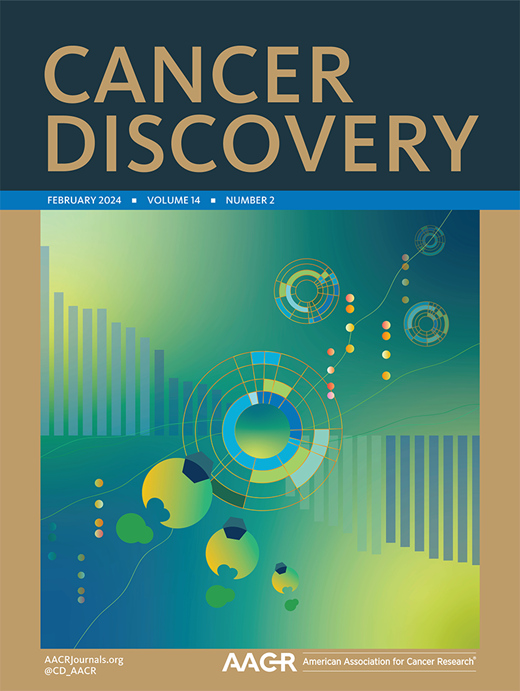Depletion of effector regulatory T cells associates with major response to induction dual immune checkpoint blockade.
IF 29.7
1区 医学
Q1 ONCOLOGY
引用次数: 0
Abstract
In a phase 2 trial, local-regionally advanced HPV-positive oropharyngeal carcinoma patients (N = 35) received ipilimumab (anti-CTLA-4) and nivolumab (anti-PD-1) as induction immunotherapy and concurrently with radiotherapy (NCT03799445). Co-primary endpoints included 6-month complete metabolic response rate (94%) and 2-year progression-free survival (84%). Induction yielded a 46% major histopathologic response rate. Single-cell profiling revealed responders had higher baseline intratumoral CD8+ T cells with a tumor-reactive, tissue-resident memory (TRM) phenotype and a treatment-related decrease in effector regulatory T (eTreg) cells. The eTreg decrease correlated with CD8+ T-cell clonotype transitioning from TRM to effector memory and IFNG+ effector cells. In nonresponders, clonotypes transitioned to exhausted TRM and proliferating cells. Multivariable regression modeling determined the baseline feature most associated with reduction in tumor viability was the proportion of FCGR3A-expressing NK cells, which are capable of ipilimumab-dependent depletion of CTLA4high eTregs. eTreg depletion may be critical for major response to induction dual immune checkpoint blockade.效应调节性T细胞的耗竭与诱导双免疫检查点阻断的主要反应有关。
在一项2期试验中,局部晚期hpv阳性口咽癌患者(N = 35)接受ipilimumab(抗ctla -4)和nivolumab(抗pd -1)作为诱导免疫治疗并同时进行放疗(NCT03799445)。共同主要终点包括6个月完全代谢缓解率(94%)和2年无进展生存期(84%)。诱导产生了46%的主要组织病理反应率。单细胞分析显示,应答者具有更高的基线肿瘤内CD8+ T细胞,具有肿瘤反应性、组织驻留记忆(TRM)表型和治疗相关的效应调节性T细胞(eTreg)减少。eTreg的减少与CD8+ t细胞克隆型从TRM向效应记忆细胞和IFNG+效应细胞转变有关。在无应答者中,克隆型转变为耗尽的TRM和增殖细胞。多变量回归模型确定了与肿瘤生存能力降低最相关的基线特征是表达fcgr3a的NK细胞的比例,这些细胞能够依赖伊匹单抗耗尽ctla4高eTregs。eTreg耗竭可能对诱导双免疫检查点阻断的主要反应至关重要。
本文章由计算机程序翻译,如有差异,请以英文原文为准。
求助全文
约1分钟内获得全文
求助全文
来源期刊

Cancer discovery
ONCOLOGY-
CiteScore
22.90
自引率
1.40%
发文量
838
审稿时长
6-12 weeks
期刊介绍:
Cancer Discovery publishes high-impact, peer-reviewed articles detailing significant advances in both research and clinical trials. Serving as a premier cancer information resource, the journal also features Review Articles, Perspectives, Commentaries, News stories, and Research Watch summaries to keep readers abreast of the latest findings in the field. Covering a wide range of topics, from laboratory research to clinical trials and epidemiologic studies, Cancer Discovery spans the entire spectrum of cancer research and medicine.
 求助内容:
求助内容: 应助结果提醒方式:
应助结果提醒方式:


